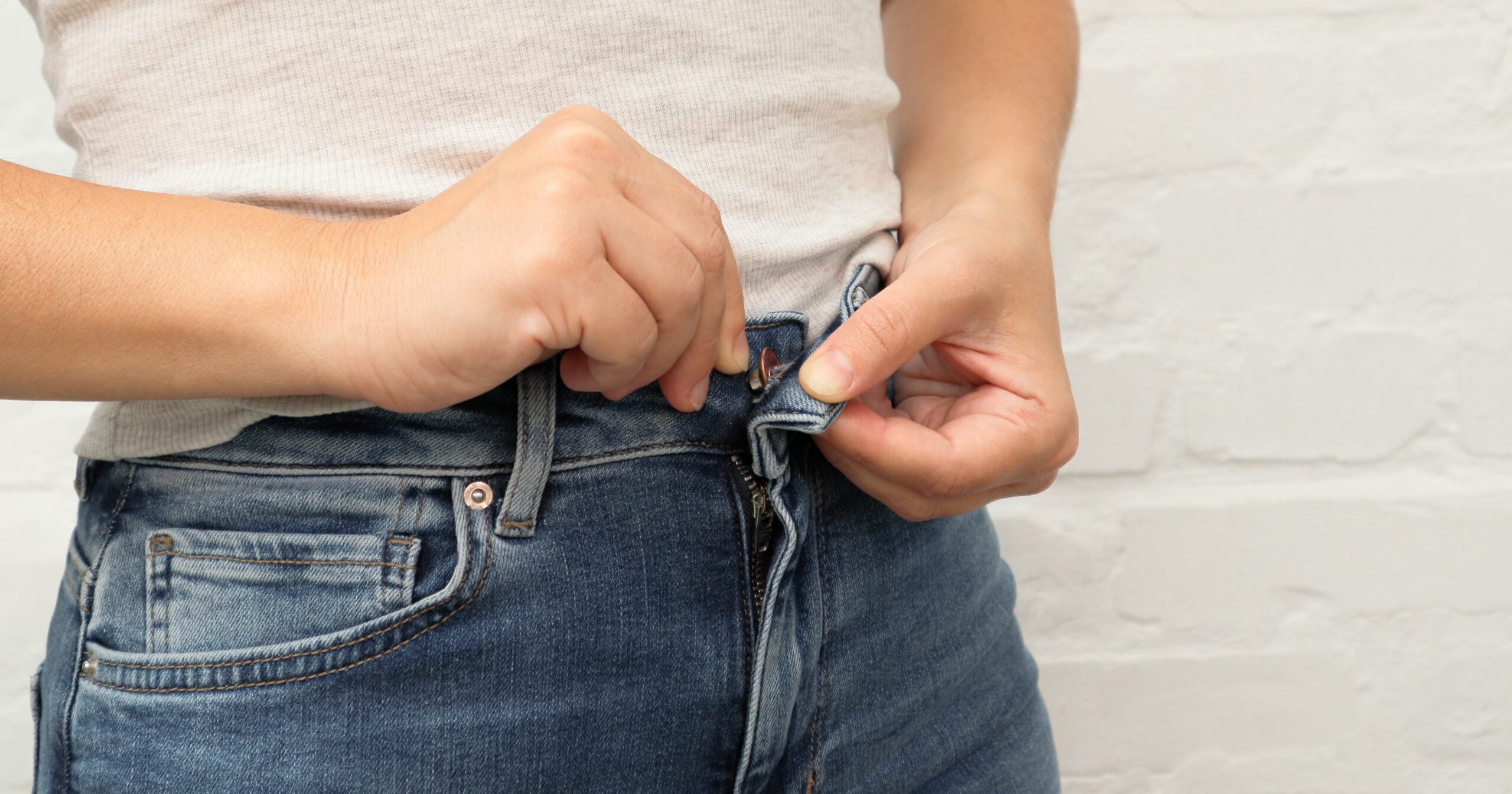Do you own a pair of “standing jeans?” You know – the kind of jeans that are so stiff and tight, you only wear them when you’re certain you’ll be standing the entire night? It may sound like a niche experience, but based on the millions of TikTok views, it’s clear that we’re not alone in our #StandingJeans, no matter how uncomfortable they are. Still, as relatable as this trend might be, it turns out that standing jeans might be causing more harm than we realize.
The term “standing jeans” is really just a way to describe a relatively timeless trend (aka tight or rigid denim). That being said, tight pants can be notoriously bad for your health. “Skinny Pant Syndrome,” for instance, is a real medical condition (called meralgia paresthetica) that causes numbness as the result of nerve damage in the thigh. So, while a flattering pair of standing jeans may look great on, do the risks outweigh the benefits? To find out more, we spoke with gut specialist Erin Hendriks, MD, about how standing jeans can actually impact your stomach. Read on to get the full scoop.
Experts Featured in This Article:
Erin Hendriks, MD, is a board-certified family physician at Salvo Health, with a focus on chronic gut conditions and gut health.
What Are Standing Jeans?
“Standing jeans” is a trending term used to describe pants that look and feel great . . . so long as you don’t sit down. It’s the pair of jeans that leaves imprints on your skin by the end of the night. By contrast, sitting jeans leave a little more wiggle room – literally. “These are the jeans you can still eat in,” one TikTok user explains. If you’re shopping and not sure which type of jeans you’re looking at, try the “sit test” which is exactly as it sounds. Simply put the pants on and sit down. If you feel that waist band slice deep into your lower abdomen – you know you’ll be standing for the remainder of the evening.
Standing Jeans Risks
The bad news is, if you experience frequent gas or bloating after a meal, you will likely experience additional discomfort if you’re wearing clothing that restricts the abdomen from expanding (standing jeans included). “Tight pants can put pressure on the abdomen, pushing the stomach and intestines upward towards the esophagus,” Dr. Hendriks says. “This can increase the likelihood of acid reflux and heartburn.”
Those with irritable bowel syndrome or other chronic gut conditions may also experience a worsening of symptoms with tighter clothing – but ultimately it depends on how you’re feeling that day. “People who suffer from chronic gastrointestinal conditions like IBS often have good days and bad days,” Dr. Hendriks says. “While there is no contraindication to wearing tight clothing when you have IBS, if you are already experiencing bloating or abdominal discomfort, then tight jeans may make you feel worse.”
Is There a Way to Recover From Standing Jeans?
If you plan to wear a tight fitting outfit to a particular event, you may want to plan ahead by avoiding foods that are more likely to cause bloating (such as garlic, onions and green leaf vegetables), Dr. Hendriks says. You can also avoid foods that trigger heartburn, considering it’s more likely to occur when wearing tight fitting clothing.
“When it comes to gut health it is important to listen to your body. You know yourself best,” Dr. Hendriks says. “There are recommendations for taking care of your gut that are universal, such as consuming a wide variety of whole plant foods, moving your body regularly, and getting enough sleep. Then there are the recommendations that are more personalized, and vary from person to person, such as whether tight jeans trigger symptoms or not.” At the end of the day, if “standing jeans” are only worn occasionally, it likely won’t lead to significant health problems. However, if your go-to outfit includes clothing that restricts digestion, you may end up dealing with some longer-lasting side effects. If you’re concerned about your standing jeans and how they may affect any underlying conditions, consult with your healthcare provider for the best personalized medical advice.
– Additional reporting by Chandler Plante
Melanie Whyte was a contributing staff writer for PS. Based in NYC, she writes about LGBTQ+ identity, sex and relationships, pop culture hot takes, mental health, and home improvement. Her work has been featured by Refinery29, Real Simple, Apartment Therapy, Southern Living, Coveteur, NPR, and more.
Chandler Plante is an assistant editor for PS Health & Fitness. Previously, she worked as an editorial assistant for People magazine and contributed to Ladygunn, Millie, and Bustle Digital Group. In her free time, she overshares on the internet, creating content about chronic illness, beauty, and disability.



